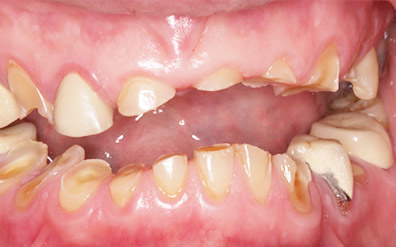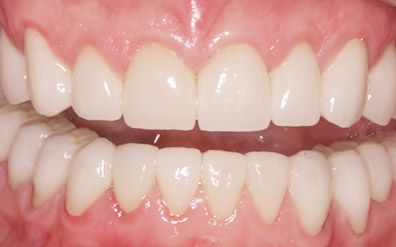Visit Our Office 155 W. 68th Street #228
New York, NY 10023
Call or Text
212.724.6280
When to see a Periodontist
What is a Periodontist?
A periodontist is a dentist who specializes in the prevention, diagnosis and treatment of periodontal diseases (gum disease.) The specialty of Periodontics also involves the treatment planning, placement, and maintenance of dental implants. In order to become a periodontist, a dentist must first complete four years of dental school and then an additional three years in a periodontic specialty-training program. The American Dental Association recognizes eight different dental specialties, Periodontics being one of the eight. Periodontists are extensively trained in offering services which include implant dentistry, dental surgery procedures, gum surgery, crown lengthening, gum grafts, atraumatic extractions & bone grafts, sinus lifts and comprehensive treatment planning
When to See a Periodontist
Periodontal treatment may be sought in several ways. Your general dentist or a hygienist may recommend a consultation with a periodontist if they find signs of periodontal disease through the course of a checkup or other dental care appointment. You may also decide to see a periodontist on your own as a referral is not necessary to be seen at our office.
In fact, if you experience any of these symptoms, we encourage you to schedule an appointment at our office without delay:
- Bleeding while brushing or eating normal foods. Unexplained bleeding while performing regular cleaning or consuming food is the most common sign of a periodontal infection.
- Bad breath. Ongoing halitosis (bad breath), which continues despite rigorous oral cleaning, can point to periodontitis, gingivitis or the beginnings of a gum infection.
- Loose teeth and gum recession. Longer-looking and loose-feeling teeth can indicate recession of the gums and/or bone loss as a result of periodontal disease.
- Related health concerns. Patients with heart disease, diabetes, osteopenia or osteoporosis are often diagnosed with correlating periodontal infections. The bacterial infection can spread through the blood stream, affecting other areas of the body.
The inside of the mouth is normally lined with a special type of skin (mucosa) that is smooth and coral pink in color. Any alteration in this appearance could be a warning sign for a pathological process. The most serious of these is oral cancer.The following are common signs of a pathologic process or cancerous growth:
- Reddish patches (erythroplasia) or whitish patches (leukoplakia) in the mouth.
- A sore that fails to heal, and bleeds easily.
- A lump or thickening on the skin lining the inside of the mouth.
- Chronic sore throat or hoarseness.
- Difficulty chewing or swallowing.
These changes can be detected on the lips, cheeks, palate, and gum tissue around the teeth, tongue, face, and/or neck. Pain does not always occur with pathology and, curiously, is not often associated with oral cancer. However, any patient with facial and/or oral pain without an obvious cause or reason may also be at risk for oral cancer. We recommend performing an oral cancer self-examination monthly.
Remember that your mouth is one of your body’s most important warning systems. Do not ignore suspicious lumps or sores. Please contact us so we may help.
Periodontal Disease
What is periodontal disease? Periodontal diseases are gum diseases that affect the gums, gum tissues, and the teeth. The term periodontal translates as “around the tooth.” Under the umbrella definition of periodontal disease, one will find diseases like periodontitis and gingivitis which are both serious infections of the gums. The harmful effects of gum disease include potential tooth loss, and individuals can actually have periodontal disease and not even be aware that they have it until the condition worsens.
Chronic periodontal disease is a lasting bacterial infection which has harmful effects on the bones that support one’s teeth as well as the gums and tissues surrounding one’s teeth. It has been determined by a variety of studies that some 75 percent of adult tooth loss is due to the existence of periodontal disease. Periodontal disease does not discriminate; it can have an effect on one or all of an individual’s teeth, and it can affect individuals of all ages, genders, and races. The onset of periodontal disease and issues with the gums is instigated by plaque and the bacteria in plaque in most cases. Plaque is a colorless film that forms on the teeth continuously; the substance is sticky and clings to one’s teeth, which later causes the gums to be severely irritated and infected.
What is periodontal disease? It is a disease occurring in the mouth of an individual that, over time, can produce a loss of teeth, as well as a variety of other major health issues. Periodontal disease is something that needs to be treated by a trained periodontist as soon as possible to secure the longevity of one’s oral health.
Back to Top
Healthy and Diseased Gums
Warning Signs of Gum Disease:

- Red, swollen or tender gums
- Bleeding while brushing or flossing
- Gums that pull away from the teeth
- Loose or separating teeth
- Pus between the gum and the tooth
- Persistent bad breath
- A change in the way your teeth fit together when you bite
- A change in the fit of partial dentures
Periodontitis and Heart Disease
Because periodontal disease is a bacterial infection, periodontal bacteria can enter the blood stream and travel to major organs and begin new infections. The heart is one of the most susceptible organs.
 Several theories exist to explain the link between periodontal disease and heart disease. One theory is that oral bacteria can affect the heart when they enter the blood stream, attaching to fatty plaques in the coronary arteries (heart blood vessels) and contributing to clot formation.
Several theories exist to explain the link between periodontal disease and heart disease. One theory is that oral bacteria can affect the heart when they enter the blood stream, attaching to fatty plaques in the coronary arteries (heart blood vessels) and contributing to clot formation.
Researchers have found that people with periodontal disease are almost twice as likely to suffer from coronary artery disease as those without periodontal disease.
It is very important that you always provide your periodontist with a comprehensive and accurate medical history, including any problems you are aware of with your heart. Some existing heart conditions such as a history of rheumatic fever, mitral valve prolapse or heart murmur may require antibiotics prior to dental procedures. Your periodontist and physician can work together to help you protect both your gums and your overall health.



